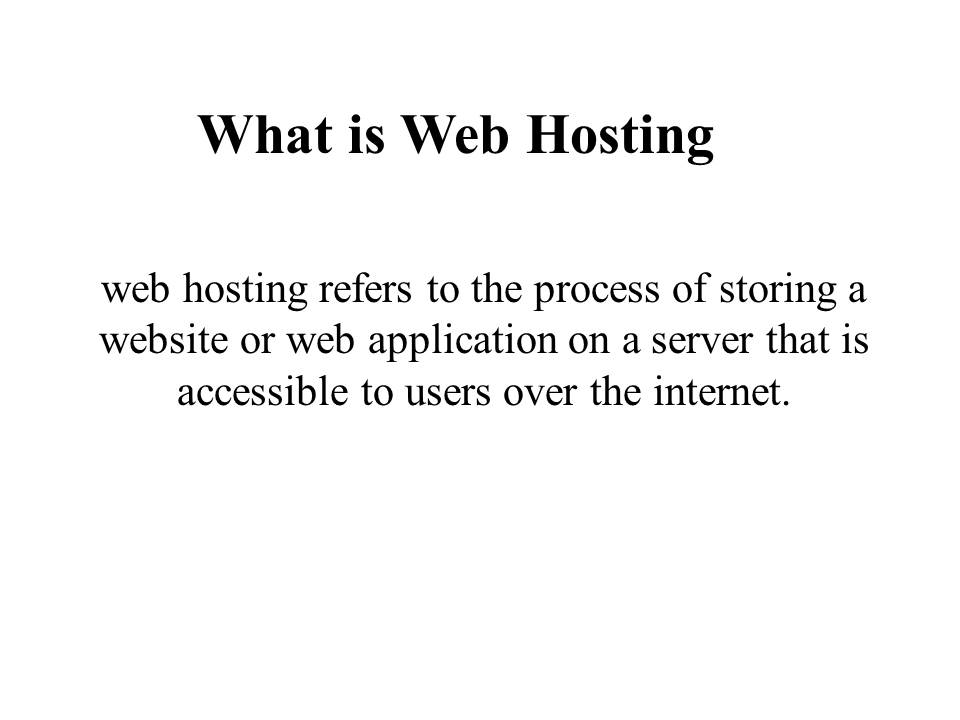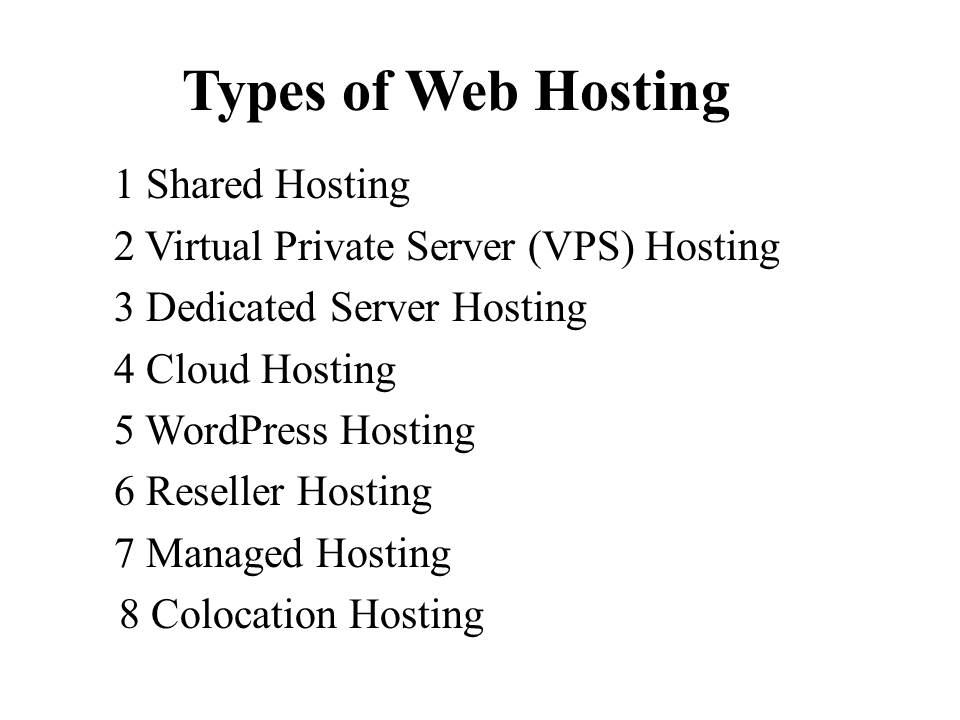Understanding Web Hosting: A Comprehensive Guide to Types and Technologies
In today’s digital age, the internet is the lifeblood of business, communication, and personal expression. Behind every website or web application, there’s a fundamental infrastructure known as web hosting that makes it accessible to the world. In this extensive 3000-word article, we’ll delve deep into the concept of web hosting, explore its significance, and take an in-depth look at various types of web hosting.
Table of Contents
- Introduction
- What is Web Hosting?
- 2.1 Definition
- 2.2 How Web Hosting Works
- Types of Web Hosting
- 3.1 Shared Hosting
- 3.2 Virtual Private Server (VPS) Hosting
- 3.3 Dedicated Server Hosting
- 3.4 Cloud Hosting
- 3.5 WordPress Hosting
- 3.6 Reseller Hosting
- 3.7 Managed Hosting
- 3.8 Colocation Hosting
- How to Choose the Right Web Hosting
- Conclusion
1. Introduction
In the digital era, the internet has become an integral part of our lives. We shop online, connect with friends through social media, and access vast amounts of information through websites and web applications. However, have you ever wondered how websites and web applications are accessible 24/7? The answer lies in web hosting.
2. What is Web Hosting?
2.1 Definition
At its core, web hosting refers to the process of storing a website or web application on a server that is accessible to users over the internet. This server is often maintained by a web hosting provider, which ensures that your website is available to visitors around the clock.
2.2 How Web Hosting Works
The process of web hosting involves several key components:
- Server: A server is a powerful computer that stores your website’s files, databases, and other resources. Servers are typically hosted in data centers, which are secure facilities designed to provide optimal conditions for server operation.
- Domain Name: A domain name is your website’s unique address on the internet, such as www.yourwebsite.com. When a user enters your domain name into their web browser, it translates to an IP address, which is used to locate and retrieve your website’s content from the server.
- Files and Databases: Your website’s files, including HTML, CSS, images, and videos, are stored on the server. Databases, if applicable, store dynamic content like user profiles or product information.
- Bandwidth: Bandwidth refers to the amount of data that can be transferred between the server and users’ devices. Hosting plans often come with specific bandwidth limits.
- Control Panel: Many hosting providers offer a control panel, such as cPanel or Plesk, which allows you to manage various aspects of your hosting, including file uploads, email accounts, and domain settings.
Now that we understand the fundamentals of web hosting, let’s explore the various types of web hosting services available.

what is web hosting
3. Types of Web Hosting
The choice of web hosting service depends on factors such as website size, traffic volume, technical requirements, and budget. Here are the most common types of web hosting:
3.1 Shared Hosting
Shared hosting is an entry-level hosting solution where multiple websites share resources on a single server. It’s an economical option suitable for small personal websites or startups with limited traffic.
Pros:
- Cost-effective.
- User-friendly for beginners.
- Maintenance is handled by the hosting provider.
Cons:
- Limited resources may result in slower performance during traffic spikes.
- Limited control over server settings.
- Security may be a concern if one website on the server is compromised.
3.2 Virtual Private Server (VPS) Hosting
VPS hosting offers a middle ground between shared hosting and dedicated server hosting. It involves dividing a physical server into multiple virtual servers, each with its resources and operating system. This provides more control and better performance than shared hosting.
Pros:
- Greater control and customization options.
- Improved performance and scalability.
- Isolation from other websites on the server enhances security.
Cons:
- Costs more than shared hosting.
- Requires some technical expertise to manage effectively.
- Limited resources compared to dedicated servers.
3.3 Dedicated Server Hosting
Dedicated server hosting provides an entire physical server dedicated to a single website or client. This option is ideal for large businesses, high-traffic websites, or applications with intensive resource requirements.
Pros:
- Maximum control over server configurations.
- Exceptional performance and reliability.
- Enhanced security and isolation from other users.
Cons:
- Expensive compared to shared or VPS hosting.
- Requires advanced technical skills to manage.
- Responsibility for server maintenance and updates falls on the client.
3.4 Cloud Hosting
Cloud hosting involves distributing website data across a network of interconnected virtual servers (the cloud). This ensures redundancy, scalability, and high availability. Resources can be scaled up or down as needed, making it suitable for websites with variable traffic patterns.
Pros:
- Scalability and flexibility.
- High uptime and reliability.
- Pay-as-you-go pricing model.
Cons:
- Pricing can become expensive as resources are scaled up.
- Technical knowledge may be required to manage the cloud infrastructure.
- Security concerns related to cloud data storage.
3.5 WordPress Hosting
WordPress hosting is specialized for websites built on the WordPress content management system (CMS). It often includes features like one-click WordPress installation, automatic updates, and optimized server configurations for WordPress websites.
Pros:
- Streamlined WordPress management.
- Enhanced performance and security for WordPress sites.
- Pre-configured settings for WordPress compatibility.
Cons:
- Limited to WordPress websites.
- May have higher costs compared to shared hosting.
- Less flexibility for non-WordPress websites.
3.6 Reseller Hosting
Reseller hosting allows individuals or businesses to purchase hosting resources and then resell them to others. It’s an option for entrepreneurs looking to start their web hosting businesses.
Pros:
- Opportunity to generate revenue by reselling hosting services.
- Hosting provider manages server maintenance.
Cons:
- Requires marketing and customer support efforts.
- Potential competition with established hosting providers.
- Limited control over server infrastructure.

type of web hosting
3.7 Managed Hosting
Managed hosting services are designed for users who want a hands-off approach to hosting. The hosting provider takes care of server management, maintenance, and technical support, allowing website owners to focus on their content or business.
Pros:
- Minimal technical involvement required.
- Reliable technical support.
- Time-saving, as server management is handled by experts.
Cons:
- Typically more expensive than self-managed options.
- Limited control over server configurations.
- May have resource limitations depending on the provider.
3.8 Colocation Hosting
Colocation hosting involves renting space in a data center to house your own server hardware. This option is chosen by organizations that prefer to own and maintain their server hardware while benefiting from the data center’s infrastructure.
Pros:
- Full control over server hardware and configurations.
- High security and reliability provided by the data center.
- Ideal for businesses with specific hardware requirements.
Cons:
- Requires substantial upfront investment in server hardware.
- Responsibility for server maintenance and updates.
- Dependence on the data center’s infrastructure.
4. How to Choose the Right Web Hosting
Selecting the right web hosting service is crucial for the success of your website or online business. To make an informed choice:
- Assess Your Needs: Determine your website’s size, expected traffic, and technical requirements.
- Consider Budget: Balance your hosting needs with your budget constraints.
- Evaluate Features: Examine features like storage, bandwidth, scalability, and technical support.
- Check Uptime and Reliability: Look for hosting providers with high uptime guarantees.
- Read Reviews: Research user reviews and recommendations for hosting providers.
- Test Support: Contact the hosting provider’s support team to gauge their responsiveness and expertise.
- Consider Future Growth: Choose a hosting solution that can accommodate your website’s future growth.
5. Conclusion
Web hosting is the invisible force behind the websites and web applications we interact with daily. Understanding the types of web hosting available and their respective pros and cons is essential for making an informed decision about hosting your own website or online project. Whether you’re running a personal blog, an e-commerce site, or a complex web application, there’s a web hosting solution tailored to your needs. Choose wisely, and your online presence will thrive in the digital landscape.
Certainly! Here are a few examples of popular web hosting providers as of my last knowledge update in September 2021. Please note that the hosting landscape can change, so it’s important to do your own research to find the most up-to-date and suitable option for your needs:
- Bluehost: Bluehost is known for its affordability and user-friendly interface. It’s often recommended for beginners. They offer shared hosting, VPS hosting, and dedicated hosting plans.
- HostGator: HostGator provides a wide range of hosting services, including shared hosting, cloud hosting, VPS hosting, and dedicated servers. They are known for their 24/7 customer support.
- SiteGround: SiteGround is known for its excellent customer support and fast-loading websites. They offer shared hosting, cloud hosting, and dedicated hosting options.
- A2 Hosting: A2 Hosting is recognized for its speed and performance optimizations. They provide shared hosting, VPS hosting, and dedicated hosting plans.
- Hostinger: Hostinger is a budget-friendly hosting provider that offers shared hosting, cloud hosting, and VPS hosting. They are known for their competitive pricing.
- InMotion Hosting: InMotion Hosting is known for its reliable service and good customer support. They offer shared hosting, VPS hosting, and dedicated hosting, along with business hosting options.
- DreamHost: DreamHost is an established hosting provider that offers a range of hosting services, including shared hosting, VPS hosting, and dedicated hosting. They also have a strong focus on website security.
- WP Engine: WP Engine specializes in managed WordPress hosting. They provide high-performance hosting optimized for WordPress websites.
- HostWinds: HostWinds offers a variety of hosting solutions, including shared hosting, VPS hosting, and dedicated hosting. They are known for their customizable plans.
- Liquid Web: Liquid Web is a premium hosting provider that specializes in managed hosting solutions, including managed WordPress hosting, cloud hosting, and dedicated servers. They are known for their excellent customer support.
Remember that the best web hosting provider for your needs depends on factors like your website’s size, traffic, budget, and technical requirements. It’s a good idea to read reviews, compare features, and consider your specific needs before choosing a web hosting provider. Additionally, the hosting landscape may have changed since my last update, so be sure to check for the latest information and reviews when making your decision.

